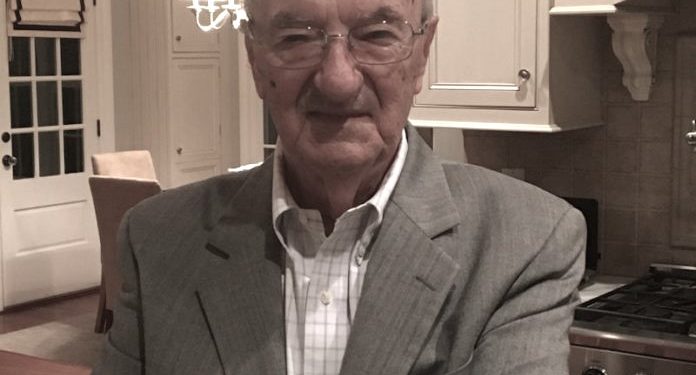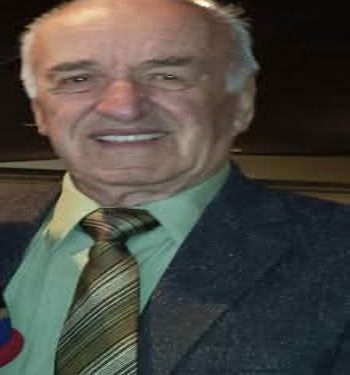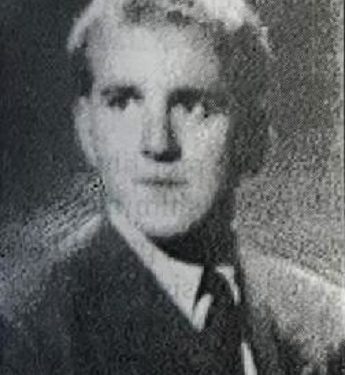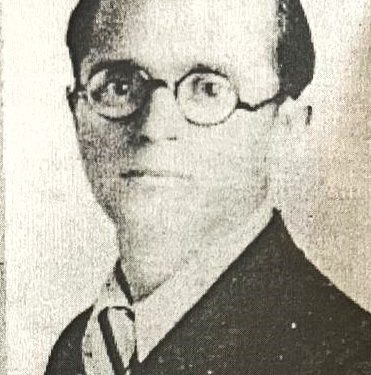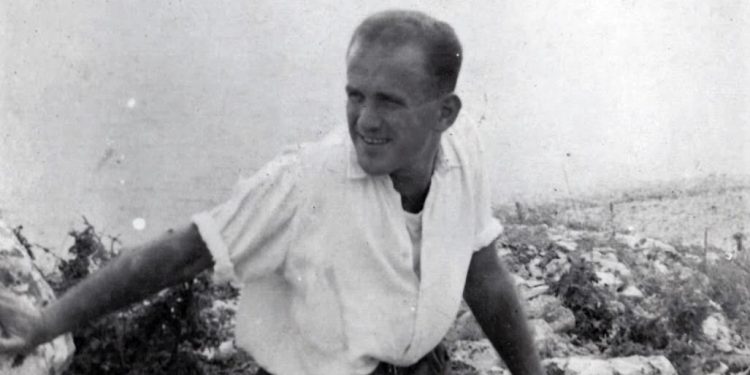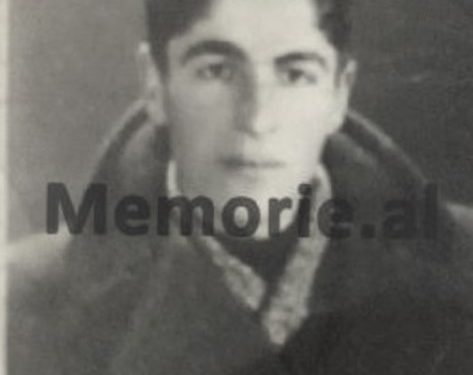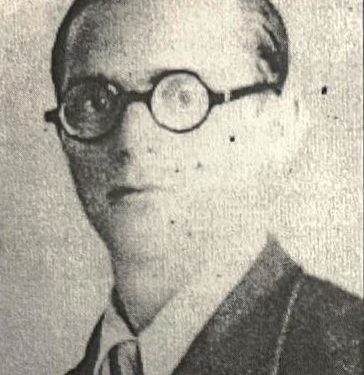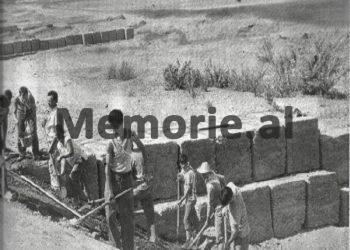By Ahmet Bushati
Part twenty
Memorie.al/After the flag was altered in 1944 with the addition of the communist star, Shkodra transformed into a center of resistance against the regime, paying a high price for its tradition of freedom. By April 1945, high school students, already feeling betrayed by the promises of the war, gathered to oppose the new terror that imprisoned and killed innocent people. Communism turned Kosovo into a province of Yugoslavia, while Shkodra was punished for its “historical crime”- its defiance against invaders. The “Postriba Movement” became a tool to suppress all dissent, plunging the city into an unprecedented spiral of suffering: imprisonments, executions, and the destruction of families. The high school students, alongside citizens, became symbols of resistance, while some “young communists” turned into tools of the State Security, leading to expulsions, imprisonments, and internments.
Four times, Shkodra rose in armed rebellion, but history forgot these battles. This book is written to remember the countless prisoners, the tortured, the killed, and the parents who suffered in silence. It is a warning against dictatorship and a plea for future generations not to forget the sacrifices made for freedom.
Continued from the previous issue
In the Footsteps of a Diary
Shkodra in the first years under communism
Mark, released from prison after ten years, would finally find some solace in an engagement he had made, and his mother, Katia, – as her neighbors and relatives called her for short – would tell them that she was new, but not for long, because Mark, as if they had only spent a few months of engagement and “suffering”, would die suddenly while working as a surveyor in the Zadrima field. Someone had said that he was poisoned by the Sigurimi people, which apparently were not proven. However, Katrina herself, for the most terrible punishment of fate, was alive and well.
At the time Mark was dying in the Zadrima Field, Katrina and his fiancée had gone to Theth to visit their people, and when, after receiving the news, they arrived home around midnight, they would find the room surrounded by Mark’s former imprisoned comrades, and Katrina, without even setting foot inside, with a broken heart, but holding on tightly to habit, would address the room in a manly voice: “From the slave men, or from God?”, and as she received the immediate response of several acquaintances, she would begin to pray one by one with everyone who was there, and then, like a mother, would let go of the broken heart on the lifeless body of her son lying in the middle of the room.
Sami Repishti’s Testimony
Forestry engineer Fahri Rusi, former customs and later finance official Qamil Nikshiqi, pharmacist Elez Troshani, university students Xhevat Meta and Sami Repishti, geometer Ndoc Gjoka and their youngest, high school student Sulejman Qehaja, after the events of Postriba, would be thrown into prison one after the other, accused of “hostile activities against the people’s government”!
Regarding the activity of this group, I bring to the reader Sami Repishti himself, with his unpublished material, which he had sent me from the USA, where he had lived for more than four decades: “One day the geometer Ndoc Gjoka, who was working with me, informed me that he had made contact with an old woman, the mother of two fugitive sons, Abdyl and Xhelal Hardolli.
During the years of occupation, I had seen these brothers when they served as translators for the Military Missions of the British League in Albania. The old woman had complained that she had no means to provide for them, in a cave somewhere near the city. Then I began to collect aid from former trusted friends and, through Ndoc, we gave it to the old woman. I told Qamil (Qamil Nikshiqi), about the new connections with Brother Hardolli.
When I saw that he was ready to help, I also told him about Ndoc. “Our group now has a cell,” I laughed to myself, but it was true. The spirit of conspiracy bound us even more. My office and Qamili’s, were transformed into a discussion club with an anti-government character. Contact with Brother Hardolli, although indirect, marked our collaboration with the fugitives. At my request, Brother Hardolli accepted to print two tracts in cyclostyle, which my friends and I distributed in October and November of 1945, a few days before the first elections of December 1945.
Meanwhile, unconfirmed rumors circulated that the Hardolli brothers had connections with a Catholic priest in Shestan in Krajës, through whose radio the news from Albania was broadcast. I accepted this version that Ndoc Gjoka gave me and from time to time, we would send news to the Hardolli brothers, through the old woman. After working hours, my most frequent meetings were with Eqrem Rusi, an old friend from the lyceum, as well as with the final year student of the lyceum, Sulejman Qehanë.
In September 1945, the possibility of creating an organization that would coordinate our activity was discussed for the first time. At the first meeting (Eng. Fahri Rusi, Eqrem Rusi and Sami Repishti) the general lines were defined. The name “Democratic Youth Organization” was proposed by Eng. Fahri Rusit, who was much more mature than the rest of us. A few days later, Eqrem Rusi and I formulated the main lines of the program.
The first step was the distribution of a tract distributed by Ndoc Gjoka, Eqrem Rusi and Sami Repishti. A copy of the tract reached Father Gjon Shllaku, through the intermediary of Ndoc Gjoka. One day, Ndoc Gjoka informed me that Father Gjoni had the honor of meeting with me. The meeting took place in a dark classroom of the Franciscan Lyceum. There were no people or lights. In the room that was slightly illuminated by the lights of the main street, I met the philosopher brother. Throughout the conversation, in a low voice, Father Gjoni emphasized the need for a modern organization of anti-communist youth, cooperation with students and especially the participation of girls in the organization. He criticized the “academic” content of our tract and advised us to prepare a new, “more political” tract. He suggested that we attack the anti-democratic nature of the upcoming elections. In my meetings with F. Rusi, E. Rusi, Q. Nikshiqi, S. Qehaja and Xhevat Meta, I individually explained Father Gjoni’s thoughts, without mentioning his name.
With Eqrem Rusi, we then prepared the second tract, approved by Fahri Rusi, who supervised our activity, through which we denounced the politics of manipulated elections. The Hardolli brothers made the copies of the tract. The distribution of the tract was done by Qemal Nikshiqi, E. Rusi, Ndoc Gjoka and Sami Repishti, and some copies by Man Qehaja. A day earlier, an English Labour MP, Mr. Hutchinson and in his honor at the ‘Great Cafe’ a dinner was given. Ndoc Gjoka had arranged for him to come inside as a worker. In the afternoon of that day, Xh. Meta, N. Gjoka and S. Repishti prepared a Memorandum on the situation in Albania and the unfair elections.
It was translated into French by Sami Repishti, while its delivery was made by Ndoc Gjoka, in a corridor of the ‘Great Cafe’. The last phrase of the Memorandum was: “Faites attention, s’il vous plait, aux methodes diabolices importees de l’Union Sovietique”. With the distribution of the second tract we gained more confidence. But the enthusiasm was interrupted by the arrest of the group of the “Albanian Union” and the “Christian Democrats”. Among those arrested was Father Gjon Shllaku who said nothing about our meeting. The Franciscan friar paid with his life for his loyalty to his faith and thoughts.
On the advice of Fahri Rusi, it was decided to stop our illegal actions. But in the meantime, as per the suggestion of Xh. Meta, it was decided to contact Kel Çoba and a group of young people. S. Qehaja informed us that in his class, there were many young people ready to get involved. Through his mediation, I myself contacted the students Elisabet Hajmeli and Terezina Shllaku. Pharmacist Elez Troshani, with whom I spoke openly, would try to expand his circle among the medical staff of the hospital where he worked. In the spring of 1946, I learned that the illegal groups of the north had started contacts for a meeting somewhere between Luma and Puka, with the participation of Muharrem Bajraktar. Fahri Rusi, for his part, told me that the anti-government movement in Tirana was growing. But anyway our first cell was broken.
Ndoc Gjoka fell ill with tuberculosis; Qamil Nikshiqi changed jobs, causing our meetings to become rarer. With Eqrem Rusi, Xh. Meta and Man Qehana, the meetings continued to be frequent. Mani developed intense activity in the circle of high school students and found support from them. An unexpected event galvanized the anti-communist youth of Shkodra: the death of His Grace Gasper Thaçi, Archbishop of Shkodra, and July 1946. His funeral turned into an imposing manifestation, into a silent demonstration.
Democratic elements were challenging the forces of the Security for the first time. There I understood the great strength of the Catholic Church and the support it found among the believers. The next day in my office, two security officers had checked my desk in my absence and asked about me. Even my former colleagues started to leave me. Abdyl Kokoshi, who was recommended to me by Fahri Rusi, came from Tirana to contact the person who would contact him with Muharrem Bajraktari, I could not provide him with security, because the person in question had been arrested. We did not know it, but the State Security had been following Abdyl Kokoshi, as well as Ragip and Xhevat Meta, to contact him.
Postrriba happened and Ragip and Xhevat Meta were also arrested, as well as Abdyl Kokoshi. Later, I and my friends Qamil Nikshiqi, Fahri Rusi, Sulejman Qehaja and Elez Troshani. Abdyl Hardolli was killed in an attempt by the Security forces and Xhelal Hardolli was captured alive. Ndoc Gjoka died of tuberculosis. Eqrem Rusi and the high school students escaped arrest. Eng. Fahri Rusi and Abdyl Kokoshi, as well as Xhelal Hardolli, were sentenced to death. Ragip Meta to life imprisonment; Xhevat Meta to twenty years in prison; Qamil Nikshiqi and Sami Repishti to fifteen years in prison each; Elez Troshani to ten years, and Man Qehaja to five years in prison. “Regarding the demonstration on the occasion of the funeral of Bishop Gasper Thaçi – which was just mentioned above – it is worth adding what Father Konrad Gjolaj writes in his book Çinarët, page 92:
The date May 26, 1946 remains in the history of Shkodra, among the most unforgettable dates, where the Shkodra youth, regardless of religion, bid their last farewell to the Archbishop of Shkodra, Bishop Gasper Thaçi, openly demonstrating the venerable anti-communist figure, the leader of the Albanian Catholic Clergy, one of the most prominent personalities of the Shkodra people.
Qemal Draçini
The news that Qemal Draçini had been arrested there in Tirana, while he was working on drafting textbooks for high schools, would fall like a real bomb for many students of our high school, and especially for those who, during the previous year, had taken lessons from A few days later, one of our friends would tell us with despair how he had seen Professor Dračin tied up on the back of a pickup truck, which, as it turned out, was being brought from Tirana. And when a year later we heard about his death in Sigurim, the deepest sorrow would cover many of his former students, and I myself have no difficulty in saying that on that occasion I shed tears of pain and great longing.
Upon receiving the news of Qemal Draçini’s death, who would not be reminded of special moments from his busy and turbulent life?! Among other things, that at the age of sixteen, he had been interned in Mbreshtan in Berat and was hand in hand with Qemal Stafa and Vasil Shanto; that around that time Fishta had asked him to be his secretary; that he would still be a high school student when he was arrested by the Italians and that when he studied law in Florence, Italy, he would also be one of the youngest in his class, and as he had been in high school, again one of the most distinguished in his studies.
Due to the circumstances of the war, he would return to Albania with a burning desire to be close to his still enslaved homeland and, of course, without those early communist dreams that had once so strongly ignited his romantic adolescence. Even the idea of the last hours, before Qemal Draçini died in such a tragic way, is another pain even more for anyone who learns it. It was said that in the agony of death, he had uttered in a confused and disjointed way, words and sentences with syllables and as if without connection between them, trying to speak sometimes about the life he was leaving and, at other times, about the death, towards which he himself had headed, which shocks us, then and today, and fills us with special pain, when we consider his great and interesting world, which in those moments was fading away amidst painful struggles, about the world of a man who loved life like no other and, nevertheless, would have liked to kill it without much pain at the age of twenty-one.
I want to believe that even today; my former classmates have not forgotten the eloquent explanations, full of inspiration and fantasy, of our former professor, Qemal Draçini, back when it seemed to us that we were watching with emotion the magical opening of new worlds. Who else, like Qemal Draçini, would grieve a class of our students, when he interpreted with such a sense of pain the poems of the unfortunate Leopard?! Who, like Qemal Draçini, would ignite a flame, while trying to explain the spiritual drama of the offended and pitiful Hamlet, so much that it seemed to us that he himself was sincerely suffering at those moments?
But when he talked to us about Voltaire and his work, we were captivated as he was by the sarcasm of his intelligence, he, as if he wanted to receive our affirmation for what he had explained a little earlier, would come to us bank by bank, with an enlarged portrait of him on a full page of a French anthology, and with an expression of burning sympathy for him, would ask us: “Don’t you think that even his forehead speaks and laughs mockingly?” Look at it, look at it well! But when he recited Petrarch’s “Laura”, wouldn’t he find in the explanation of that poem precisely those delicate and peaceful notes that Petrarch himself would, so to speak, have dished out for his Laura?!
Such was our professor Qemal Draçini and such were his literature classes, from which, our most beautiful dreams for life, seemed to take on even more wings, considering that we were at that age when our feelings were flying above everything. Other former students of his can also remember how he, sometimes, as if to nourish in us a realistic sense of life, after a light sigh that he brought out from within, would add as if with regret: “Boy, it’s also a struggle to be won.”
I can say that it was a time when, how can you say, in so many of the books we read, and especially because of the sad fate of the homeland, the most beautiful feelings were growing within us with great passion and imagination, and where, without a doubt, every word of Prof. Qemal Draçini would have its important part. We, his former students who were in prison, would carry the memory of Professor Draçini with us everywhere and have it present sometimes as suffering and sighs and sometimes, as strength and inspiration.
Weapons in the Church?!
While waves of a more savage terror raged furiously over Shkodra, as a result of its alleged involvement in the events of Postrriba, when the prisons were full of citizens and when many others outside – although innocent – could not sleep peacefully at night for fear of being arrested at any moment, the communist government and the Sigurimi in Shkodra, for their part, would continue to think of new traps for this city. Thus, one day the Sigurimi would spread with great fanfare the sensational news that supposedly hidden weapons had been found in the Church of the Friars.
“Weapons in the church”?! – Everyone would ask their friends and themselves in surprise during those days. The propaganda of the government would scream at them day and night, convincingly seeking the people of Shkodra in its alibi. “Weapons in the church”, would be broadcasted relentlessly on the waves of Radio Shkodra and the “Koha e Re” newspaper of Shkodra would not stop writing about weapons in the church for several days in a row, without excluding those of Tirana. For the scandal of finding weapons in the church, they would organize mandatory meetings with the people, in order to instill in them a psychosis of fear and insecurity, as a permanent part of the communist government’s strategy, for the murder of enemy Shkodra. “The church will be hit, and thoroughly”, should have been the message coming from above, for the implementation of which trusted cadres of the Ministry of Internal Affairs of Tirana had been stationed in Shkodra for a long time.
For the alleged introduction of weapons into the church, priest At’Mati Prendushi had been arrested as early as on the 15th of November and, after him, Bishop Frano Gjini. The newspaper “Koha e Re” of November 19, under the sensational headline; “Sensational discoveries in the Assembly of the Frets”, would try to explain with great fanfare that it was a real arsenal of weapons and ammunition, such as long rifles, grenades, cartridges and boxes of ammunition. The pitiful priests, without a drop of blood on their faces and trembling, would be forced to pose with weapons in their hands in front of the cameras and film cassettes of various Albanian and Yugoslav agencies. Such sad images would fill the pages of the local newspaper of Shkodra, as well as those of Tirana, images that would later remain hanging on the walls of the atheist museum of Shkodra for decades, in order to historically hold the church under indictment.
In truth, all of the above was nothing more than a farce, a communist farce, thousands and thousands of others like them. The security forces, the night before, with the help of their own men, as well as a deacon named Ndoc Vasili, – recruited by them as a spy – and an assistant – the cook, had secretly brought weapons into the church and then, the next day, they would accuse the innocent priests. “They were caught red-handed,” communist propaganda would express with euphoria and cynicism, in the pages of the press, as would the Shkodra communists in general.
For bringing weapons into the church, Bishop Frano Gjini, Father Mati Prendushi, Dom Nikollë Deda and the provincial of the friars, Father Çiprian Nika, were accused, whom a court would sentence to death, while with life imprisonment, the ethnic Donat Kurti and Palë Doda. The truth about bringing weapons into the church would shed its light through the testimony of Father Aleks Baqli, who, while the Sigurimi and its agents were bringing weapons into the church, for the whole night, he had remained hidden in the sacristy observing and controlling everything: the Sigurimi people who were involved in bringing those weapons into the church, and with them, also the treacherous jackal and assistant cook, which we mentioned above.
Three years later, the former Sigurimi officer, Pjerin Kçira, turned into a determined opponent of the regime, when, as a prisoner, he appeared in court, he would declare before the public present in the hall that; “the Sigurimi brought the weapons into the church, in order to discredit the Catholic clergy”, a statement for which he would later be sentenced to death and shot. Father Leon Kabashi, speaking about this case, would say: “The Church owes Pjerin Kçira a debt of gratitude”! Memorie.al




